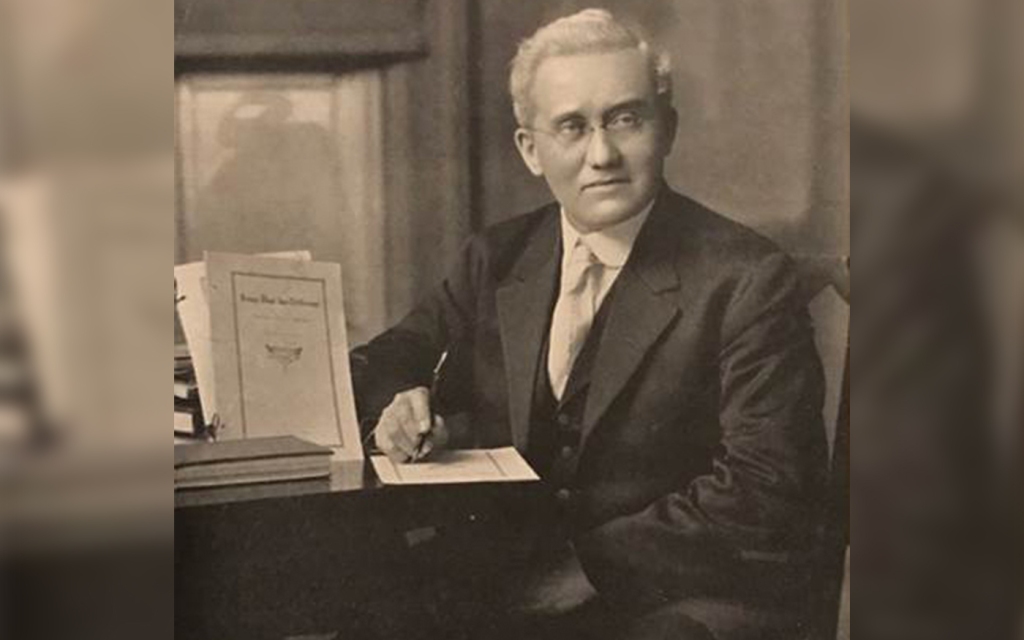Frederick Martin Lehman: Pioneer Holiness and Assemblies of God Hymn Writer
This Week in AG History–April 5, 1953 By Ruthie Edgerly ObergOriginally published on AG News, 04 April 2024 Frederick Martin Lehman (1868-1953) was a German-born hymn writer, pastor, and publisher who accepted the message of the Pentecostal movement after many years … Continue reading

This Week in AG History–April 5, 1953
By Ruthie Edgerly Oberg
Originally published on AG News, 04 April 2024
Frederick Martin Lehman (1868-1953) was a German-born hymn writer, pastor, and publisher who accepted the message of the Pentecostal movement after many years as a holiness preacher. His songs encouraged congregations to press in to holiness and consecration. One of them, “The Love of God,” is consistently listed as one of the great sacred songs of the 20th century and has been published in hundreds of hymnals and translated into scores of languages, yet his Pentecostal connections are little known.
Born in Schwerin, Germany, his family emigrated to the United States when he was just 4 years old. They settled in Iowa where Frederick grew up among other German immigrant farmers. At the age of 11, he had a deep experience with God that impacted the direction of his life. He enrolled at Northwestern College in Illinois to study for ministry with the newly formed Church of the Nazarene. He later pastored in Iowa, Indiana, and Kansas City, Missouri. It was while he was pastoring in Kansas City that he helped to found the Nazarene Publishing House in that city.
When Lehman was 23, he married Emma Lou Dermeyer, in a process he poetically described thusly: “I wooed and wed one of the loveliest maidens outside the gates of Eden.” They were married for 61 years and had nine children, many of whom also followed in Christian service.
During his ministry, Lehman did editorial work for several religious magazines and wrote a number of books, but his real knack was for poetry, which he often set to music. He wrote his first song in 1898 while pastoring in Kingsley, Iowa, and followed it with hundreds more. Many were published in 1919 in his first collection, Songs That Are Different. It was this collection that included the first publication of “No Disappointment in Heaven,” “The Royal Telephone,” and “The Love of God.”
At some point between 1912 and 1927, Lehman left the Church of the Nazarene, which had rejected the Pentecostal message of baptism in the Holy Spirit as evidenced by speaking in tongues. In the Sept. 24, 1927, issue of the Assemblies of God paper, The Pentecostal Evangel, Lehman wrote an article on “Self and Grace” in poetic form telling of this change in his life and experience:
“Once the ‘Second Blessing Movement’ moved and did exploits a few. God knocked at this Wesleyan portal, saying, “I have more for you. You are fitted best to carry news of this great latter rain — but they closed the door in blindness, hence the Master pled in vain. So He left that once-blest Movement and the boasted talent there; poured His Spirit on the simple and the unlearned everywhere … Yes, the latter rain is falling all around this sin-sick world. And recruits that number millions march beneath this flag unfurled … Savior mine and great Baptizer, Healer, and my coming King! Unto Thee ascribe we honor! Unto Thee we praises sing!”
Many of the songs he wrote as a Nazarene preacher spoke of the Pentecostal blessing, as it was a term used to describe the experience of sanctification in the holiness churches. These holiness songs were picked up by early Pentecostals. The first known recording of a Lehman song was by a female African American Pentecostal store-front preacher in Memphis, Mary M. Nelson, who released “The Royal Telephone” on an album in 1927, including these lyrics:
“If your line is ‘grounded,’ and connection true
Has been lost with Je¬sus, tell you what to do:
Prayer and faith and promise mend the broken wire,
’Till your soul is burning with the Pentecostal fire.”
As evidenced by Nelson’s early recording and the publication of songbooks, early Pentecostals adopted much of the music of the holiness churches from which many of them came. A few of the songwriters associated with these churches accepted the Pentecostal message and provided songs for the fledgling movement, among them Thoro Harris, R.E. Winsett, and Herbert Buffum.
Lehman wrote the music for “Loyal Christ’s Ambassadors,” the 1935 song for the Assemblies of God youth ministry, Christ’s Ambassadors. However, he became well-known in the broader church world because of songs such as “The Love of God,” which has been sung in churches of all denominations:
“The love of God is greater far than tongue or pen can ever tell;
It goes beyond the highest star, and reaches to the lowest hell;
The guilty pair, bowed down with care, God gave His Son to win;
His erring child He reconciled, and pardoned from his sin.
Could we with ink the ocean fill, or were the sky of parchment made,
Were every stalk on earth a quill, and every man a scribe by trade;
To write the love of God above would drain the ocean dry;
Nor could the scroll contain the whole, though stretched from sky to sky.
Oh, love of God, how rich and pure! How measureless and strong!
It shall forevermore endure — the saints’ and angels’ song.”
When Lehman died in 1953, he was a member of Trinity Assembly of God in Pasadena, California, and the Pentecostal Evangel published a notice honoring him in the April 5, 1953, issue. In 1955, the Men’s Ministry department of the Assemblies of God published an article in its TEAM publication stating that “F.M. Lehman forever laid down his pen … America lost a great song writer, and the Assemblies of God its greatest.”
Read the announcement of Lehman’s death on page 13 of the April 5, 1953, issue of the Pentecostal Evangel.
Also featured in this issue
• “The Empty Sepulcher,” by Alice Reynolds Flower
• “Channels of Resurrection Power,” by Robert Cummings
And many more!
Click here to read this issue now.
Pentecostal Evangel archived editions courtesy of the Flower Pentecostal Heritage Center.
Do you have Pentecostal historical materials that should be preserved? Please consider depositing these materials at the Flower Pentecostal Heritage Center (FPHC). The FPHC, located in the Assemblies of God national offices, is the largest Pentecostal archive in the world. We would like to preserve and make your treasures accessible to those who write the history books.
Flower Pentecostal Heritage Center
1445 North Boonville Avenue
Springfield, Missouri 65802 USA
Phone: 417.862.1447 ext. 4400
Toll Free: 877.840.5200
Email: archives@ag.org
Website: https://ifphc.org/


